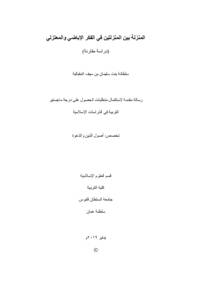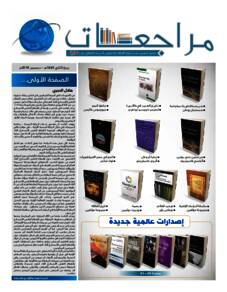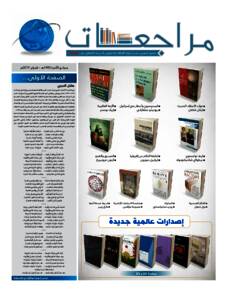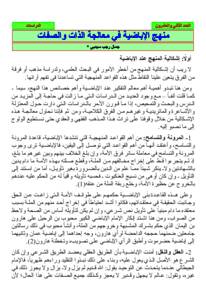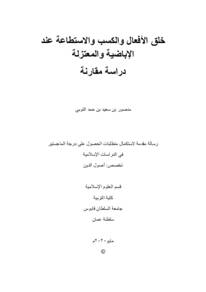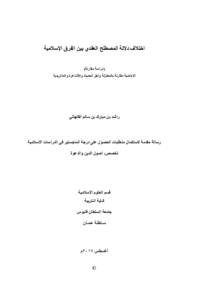Document
المنزلة بين المنزلتين في الفكر الإباضي و المعتزلي : دراسة مقارنة
Publisher
جامعة السلطان قابوس
Gregorian
2019
Language
Arabic
Subject
English abstract
This thesis examines the issue of "intermediate position of major disobedient (manzila_baina_almanzilatain) as per the Ibadi and Mu'tazila Schools of Thought in the first six centies of Hijrah. It is divided into three chapters. The preface presents the historical formation of this issue from the moment of its appearance. It highlights the relationship between this issue and the other Islamic doctrinal issues. The first chapter deals with the relationship between intermediate position of major disobed (manzila_baina_almanzilatain and the human action. The first section of this chapter identifies the point of view of the two Schools of Thought on the question of obligation and choice. The second section explains the importance of the kasb with Ibadi thought, identifying the point of view of the two Schools of Thought on the Ability and its relationship with human action. The last section addresses the question of Will, Infallibility and Abandonment. It analyzes the issue of will, indicating its relationship to Creation of Acts and Commands. It also links the issue of Infallibility and Abandonment to the human action.
Since the issue of "intermediate position of major disobedient (manzila_baina_almanzilatain)" deals with the Asma and Ahkim, the second chapter studies the Asma, explaining the link between this issue, Faith and Infidelity. The first section of this chapter addresses the truth of faith and its relation to Islam, examining its increase and decrease. It determines the position of the perpetrator of the great sins from the position of the believers according to the Ibadis and Mu'tazila. The second section studies infidelity according to the Islamic sects, explaining its levels and comparing its terms. It determines exactly the position of the perpetrator of the great sins from the position of the infidel according to the Ibadis and Mu'tazila
The third chapter focuses on the second part of the issue, which is the issue of Ahkim. It examines the link between intermediate position of major disobedient (manzila_baina_almanzilatain " and the promise and threat. It identifies the the position of the perpetrator of the great sins in regard to "Protection" and "Freedom from obligations." The second shows the reality of considering others as infidels according to the Ibadis and Mu'tazila. The third section discusses the issue of intercession, focusing on the issue of intercession with the perpetrator of the great sins. The final section concludes with issue of immortality in the hellfire, discussing the opinions of the Islamic sects and analyzing the evidence of those who are with and those who are
against.
This study concludes with several results, most notably: The Ibadis consider the issue of the multiplicity of bodies as the basis of the issue of the creation of actions; the lack of awareness of Mu'tazila of this issue has led them to them led them to immoderation. Ibadis and Mu'tazila differ in considering the perpetrators of the great sins as infidels based on their understanding of the meaning of infidelity. Ibadis consider it to be contrary to faith while the Mu'tazil considers it against it. The two sects apree that the deeds of the perpetrator of the great sins will be in vain, giving the fact that they disagree in the balance. The two sects agree on the immortality of the perpetrator of the great sins in the hellfire, but they disagree on the scale of his her punishment.
Member of
Resource URL
Arabic abstract
درست هذه الرسالة قضية المنزلة بين المنزلتين مقارنة بين الفكر الإباضي والمنزلي في القرون السنة الأولى للهجرة. وانقسمت إلى تمهيد وثلاثة فصول. عرضت في التمهيد الشكل التاريخي لهذه القضية انطلاقا من لحظة الطهور، وأبرزت علاقة هذه القضية بالقضايا العقدية الكبرى ودورها في تشكلها. وبين الفصل الأول صلة المنزلة بين المنزلتين بالفعل الإنساني، محددا موقع الفرقتين من قضية الجبر والاختيار في البيت الأول، مبينا أهمية الكسب عند الإباضية في فهم هذه القضية في المبحث الثاني، مظهرا رأي الفرقتين في الاستطاعة واقترانها بالفعل في المبحث نفسه متناولا مسألة الإرادة و العصمة والخذلان في المبحث الأخير.
وارتبطت مسالة المنزلة بين المنزلتين بالأسماء والأحكام؛ لذلك يأتي الفصل الثاني الدراسة الأسماء، الشق الأول في القضية، مبينا صلة المنزلة بين المنزلتين بالإيمان والكفر، میرزا حقيقة الإيمان و علاقة بالإسلام في المبحث الأول، ياحنا في زيادته ونقصانه، محددا منزلة مرتكب الكبيرة من منزلة المؤمن عند الإباضية والمعتزلة. ويأتي المبحث الثاني لدراسة حقيقة الكفر، باحثا في مراتبه، مقارنة بين مصطلحاته محدا منزلة مرتكب الكبيرة من منزلة الكافر عند الإباضية و المعتزلة
أما الفصل الثالث فيركز على الشق الثاني في القضية وهي مسلة الأحكام، دارسا صلة المنزلة بين المنزلتين بالوعد والوعيد، محددا موقع مرتكب الكبيرة من الولاية البراءة في المبحث الأول، عارضا لحقيقة الإحباط والتكفير في المبحث الثاني متناولا قضية الشفاعة في المبحث الثالث. خاتما بقضية الخلود في النار في المبحث الرابع.
وتخلص هذه الرسالة إلى عدة نتائج أبرزها: أن الإباضية يعتبرون مسألة تعدد الجهات الأساس الذي تقوم عليه قضية خلق الأفعال، وعدم إدراك المعتزلة لها أوصلهم إلى الغلو فيها. ويختلف الإباضية والمعتزلة في تكفير مرتكب الكبيرة بناء على مفهوم حقيقة الكفر عندهم، فالإباضية يعتبرونه نقيض الإيمان بينما يعتبره المعتزلة ضدا له ويتفق الفريقان على إحباط أعمال مرتكب الكبيرة مع اختلافهم في الموازنة بيتها. ويتق الفريقان على خلود مرتكب الكبيرة في النار، ويفترقان في قدر عذابه.
وارتبطت مسالة المنزلة بين المنزلتين بالأسماء والأحكام؛ لذلك يأتي الفصل الثاني الدراسة الأسماء، الشق الأول في القضية، مبينا صلة المنزلة بين المنزلتين بالإيمان والكفر، میرزا حقيقة الإيمان و علاقة بالإسلام في المبحث الأول، ياحنا في زيادته ونقصانه، محددا منزلة مرتكب الكبيرة من منزلة المؤمن عند الإباضية والمعتزلة. ويأتي المبحث الثاني لدراسة حقيقة الكفر، باحثا في مراتبه، مقارنة بين مصطلحاته محدا منزلة مرتكب الكبيرة من منزلة الكافر عند الإباضية و المعتزلة
أما الفصل الثالث فيركز على الشق الثاني في القضية وهي مسلة الأحكام، دارسا صلة المنزلة بين المنزلتين بالوعد والوعيد، محددا موقع مرتكب الكبيرة من الولاية البراءة في المبحث الأول، عارضا لحقيقة الإحباط والتكفير في المبحث الثاني متناولا قضية الشفاعة في المبحث الثالث. خاتما بقضية الخلود في النار في المبحث الرابع.
وتخلص هذه الرسالة إلى عدة نتائج أبرزها: أن الإباضية يعتبرون مسألة تعدد الجهات الأساس الذي تقوم عليه قضية خلق الأفعال، وعدم إدراك المعتزلة لها أوصلهم إلى الغلو فيها. ويختلف الإباضية والمعتزلة في تكفير مرتكب الكبيرة بناء على مفهوم حقيقة الكفر عندهم، فالإباضية يعتبرونه نقيض الإيمان بينما يعتبره المعتزلة ضدا له ويتفق الفريقان على إحباط أعمال مرتكب الكبيرة مع اختلافهم في الموازنة بيتها. ويتق الفريقان على خلود مرتكب الكبيرة في النار، ويفترقان في قدر عذابه.
Category
Theses and Dissertations

